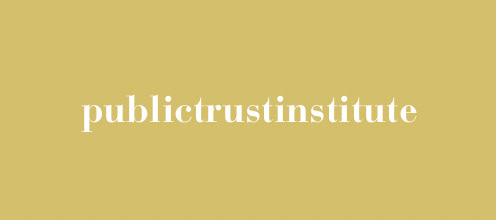The Public Trust Institute is a project (not an institute), first in the sense of being a series of conceptual and community practices, exercises, and explorations of theoretical ways of thinking, and real projects. In the second sense, it has been an ongoing (not yet named at the time) series of fulfilled community engagements, projects, and practices fulfilling the theoretical and conceptual explorations. Think and fulfilling practices relate to notions of "agora," the Greek word for a central public space in ancient Greek city-states where issues of social, political, spiritual, ecological/ecosystem, pedagogical, and cultural relations and "habitat" are being discussed, elaborated, and engaged with.
The concept of public trust, inspired by environmental principles, entails the collaborative management of shared resources, either by governing bodies or the public itself. Cultivating public trust involves nurturing dialogue, reciprocity, ethics, and authenticity in public settings and exchanges. With a particular emphasis on an in-depth exploration of the interior landscapes of communities, rather than mere symbolic gestures toward the interests of specific communities. The crisis of the disappearance of the public sphere continues at record speeds, and the idea of a "public trust" "institute" is about a critical and authentic dive into engagement in urban and natural settings where an urgent necessity remains for the voices of the global majority to be respected and integrated into the center of public thinking and reflection. Our interests encompass perceptions of cultural aesthetics, critical analysis of cultural ecosystems, relationships between artistic and curatorial practices, and considerations of ecological stewardship. We explore the impact of atmospheres (sound and nonhuman presences) as not just avenues of experience but as agents of change in urban centers, new approaches to public spheres, and the concept of "communitas" in urban contexts. Additionally, we investigate interactions between human and non-human presence in cities, the role of exhibitions as forms of "agora," intergenerational cultural exchange as avenues for historicization, the possible avenues of influence of artists and curators on urban planning and public policy, new forms of urban space as spaces (third spaces, etc) for critical exchange and or for nothing. We advocate for cultural rights (access to cultural public funding and inclusion and space) as human rights amidst current grotesque exclusion from major institutions, notions of critical diversity, and explore how experiences with art, experimental art practices, and engagement with cultural objects (visual arts, movement), social sculpture can inform societal stewardship, issues of cultural production and transmission in rapport to schemas of power.
